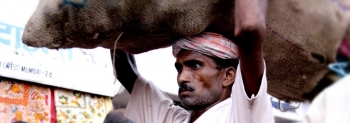
.png) Isaac Harold Gomes
Isaac Harold Gomes
.jpg)
In a recent report, Jharkhand Chief Minister Hemant Soren expressed his concern over rampant exploitation of migrant workers in various States. He voiced the urgent need to put in place, in consultation with other Chief Ministers, a robust mechanism to check migrant workers’ systematic bleeding. He lamented that even Central Government undertakings like National Thermal Power Corporation and Border Roads Organisation have failed to protect the rights of migrant workers from Jharkhand, after hiring them through contractors/middlemen for various development projects, often in very difficult terrains.
Mr. Soren cited cases where in the absence of any help from the recruiting agencies, he had to evacuate, at the state’s expense, the mortal remains of workers from Uttarakhand (where they had lost their lives in an avalanche in April and in a flash flood in February) and Jammu & Kashmir (where they died in a cloud burst). He deplored that hundreds of migrant workers are made to live in pathetic conditions in hilly and difficult terrains, without getting commensurate wages and amenities.
The Chief Minister said the exploitation of migrant workers goes on unabated due to a nexus between recruiting organisations and contractors. To put a brake on this nexus, the following remedial steps are suggested:
(1) Register all migrant workers with their respective state governments. The database needs to be shared with the Central Government/other states to claim workers’ compensation/dues and track their relocation.
(2) Fix Minimum Daily Wage Rate which is long overdue. The link https://rbidocs.rbi.org.in/rdocs/Publications/PDFs/T_94CD5A01691F7C4690A2149FEB5E7A4863.PDF shows that in 2019-20 shows that different states paid daily wages ranging from Rs 198 toRs 701. Currently Kerala pays the highest -- Rs 850 per day for unskilled workers and Rs 1000-1200 for skilled workers.
(3) Universal PF and ESI/Medical Insurance for all migrant workers across all states.
(4) Introduction of MGNREGA in urban sector.
(5) Increase the minimum of guaranteed wage employment days in MGNREGA from 100 to 150 days in a financial year.
(6) Implement social security measures and portability of social security rights like PDS, LPG, etc.
(7) Essential facilities like separate washroom, crèche, mid-day meal, children’s immunization, etc. for women migrant workers and their children.
(8) Financial help/soft loans to help women migrant workers upgrade, train and get skill development for better opportunities.
At a Webinar titled ‘Migration a Reality – Solutions and Policies that will help promote Safe Migration’ conducted by International Justice Mission (IJM) on 9th July 2020, Professor Divya Balan said that in many workplaces, there are no proper lavatories for women. She said no government policy in India discusses the issue of Menstrual Management. At the same webinar, Prof Pushpendra Kumar Singh said 90% of India’s labour force, including migrant labour, is in the unorganised sector.
Most of the unorganised sector workers do not have any legal rights and social protection benefits like paid sick leave or medical insurance. As many as 43% of migrant workers earn only up to Rs 5,000 per month. 84% of India’s unorganised workforce earn less than Rs 10,000 and 50% in unorganised sector is self-employed.
As reported in World Bank Press Release dated 14 May 2020, the Bank’s Board of Executive Directors approved a $1 billion ACCELERATING INDIA’S COVID-19 SOCIAL PROTECTION RESPONSE PROGRAM to support India’s efforts at providing social assistance to the poor and vulnerable households, severely impacted by the COVID-19 pandemic. This takes the total commitment from the Bank towards emergency COVID-19 response in India to two billion USD. A $1 billion support was announced in April 2020 towards immediate support to India’s health sector.
The new support will be funded in two tranches – an immediate allocation of $750 million for fiscal year 2020 and balance $250 million to be made available in fiscal year 2021. One key component of this new fund is to immediately help scale-up direct cash transfers and food benefits (PDS). The union government has been very cold to direct cash transfers despite recommendations of leading Indian economists of world stature. On 26th May, Uday Kotak, CMD of Kotak Mahindra Bank, had spoken on the need to direct money transfer. One year has passed, yet no opposition party has raised questions how this fund is being utilised.
In the context of hazardous/difficult terrain, Artificial Intelligence (AI) must be considered in work places namely blast furnaces, mines, avalanche and flash flood-prone areas, thermal power stations, sewage and sludge treatment, Covid garbage disposal and high-risk construction work. AI will help save lives of many migrant workers who can be gainfully redeployed through skill development based on their aptitude.
The ball is now in the court of Migrant Commissions of different Dioceses, especially CBCI as a whole, to devise an implementable and water-tight system to end migrant workers’ exploitation.